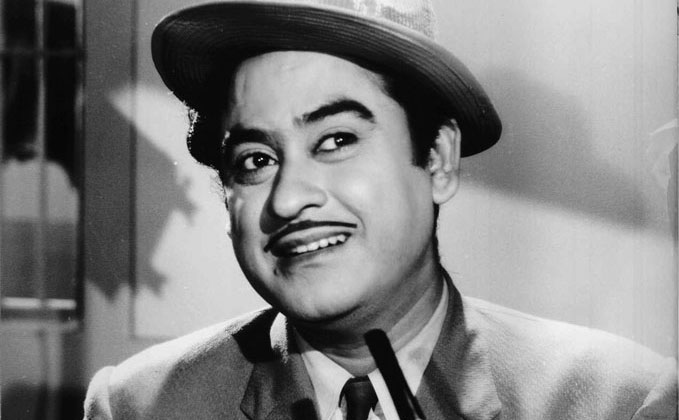
He was gifted with this rare, fluent and mellifluous voice,” said Satyajit Ray about Kishore Kumar. “As a singer of popular songs, he had no equal.”
“Just hear the word Kishore and you smile,” Amitabh Bachchan said. “That’s because his name symbolised entertainment.”
Ray and Bachchan were two of the millions in India and overseas charmed by Kishore Kumar, whose creative brilliance enriched cinema in many ways. He sang more than 2,600 Hindi film songs, including some of Bollywood’s most loveable gems, in his event-filled 40-year career. He gave Bollywood music a new idiom, introduced the art of yodelling and performed rather than sang songs. His versatility was amazing (he variously donned the hats of singer, composer, actor, lyricist, editor and director).
But music was his first passion. “Acting is fake, music comes from the heart,” he remarked famously. He was an unschooled singer, but his magic did not derive from training or technique. It was all heart, all mood. Lata Mangeshkar, who described Kishore as her favourite Bollywood singer, remarked “it’s God who guided his music.” Manna Dey once said “Kishore had the best voice of all playback singers. He made singing sound so effortless. He had no classical training but could surpass me in a song because of his wonderful musical instinct and natural singing flair.”
It is said that Kishore’s voice combined the strength, depth and richness of the male voice with the sweetness of the female voice. The sweetness is particularly noticeable in songs of pain and melancholy — such as Mera jeevan kora kagaz (from Kora Kagaz); Koi humdum na raha (Jhumroo); Zindagi ke safar mein guzar jaate hain (Aap ki Kasam); Dukhi man mere (Funtoosh); Meri bheegi bheegi si (Anamika).
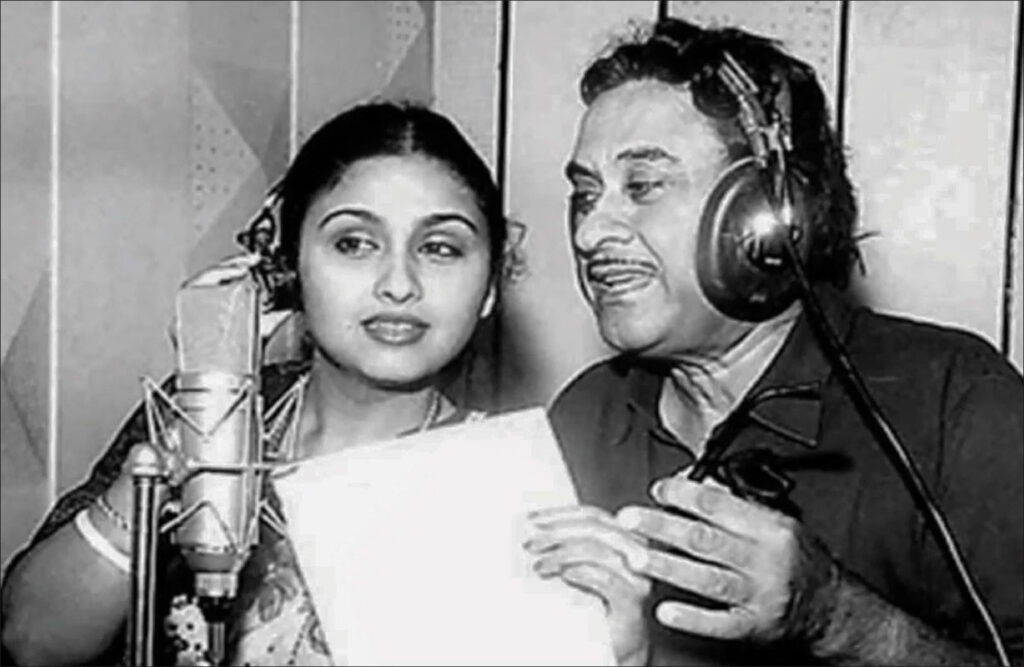
Lyricist Javed Akthar, an encyclopaedia on Hindi cinema, says that whenever Kishore sang a duet with a male or female singer, he simply stole the limelight. If there were two separate versions of a song, it was Kishore’s that clicked. Take that heart-wrenching song of disillusionment in love from the 1976 Mehbooba — Mere naina sawan bhadon — composed by R D Burman. Lata and Kishore sang the song separately at different stages of the movie. Lata was melodious as always; but Kishore’s rendition was emotionally searing, you felt the pain and despair yourself.
Kishore had a passion for singing even as a kid and idolised K L Saigal. But he had a shrill, rasping voice. When Kishore was 10 years old, he once ran toward the kitchen where his mother was chopping vegetables — and ran headlong into the chopper. One of his toes got severed and the pain was excruciating. Medical facilities those days were meagre. “Kishore cried non-stop for several hours a day for a whole month,” says brother Ashok Kumar. “The non-stop crying cleared his throat, and his voice became pleasant,” he adds.
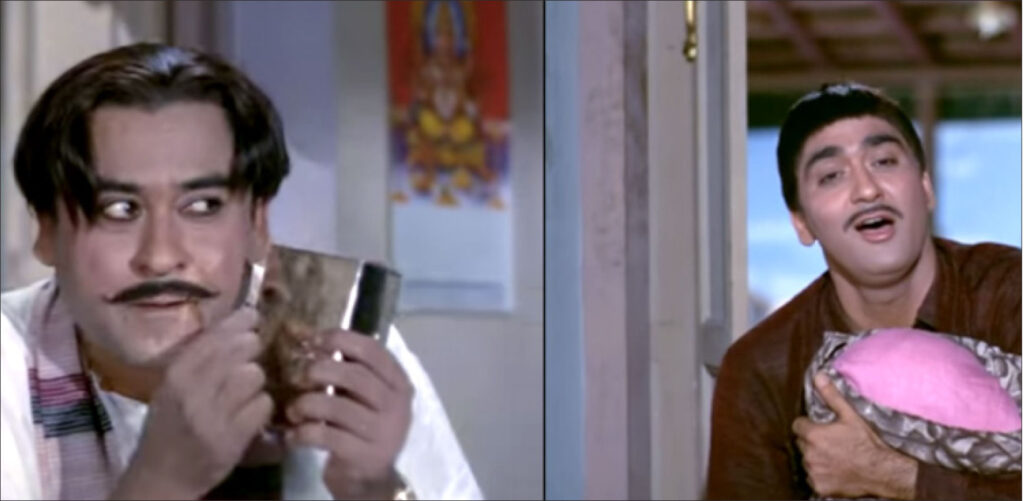
Kishore moved to Bombay at the age of 18 to meet Saigal (he never did) and sing for movies. His film career can be divided into two phases. The first phase was a 23-year struggle of ups and downs till Aradhana in 1969; the second phase, from Aradhana till Kishore’s death in 1987, was a journey of glory. He sang a few hundred Hindi film songs during the first phase, more than 2,000 in the second.
The first phase contained some luminous moments such as wonderful songs for Dev Anand composed by S D Burman for the films Munimji (Jeevan ke safar me rahi), Paying Guest (Mana janab ne pukara nahin) and Nao do gyarah (Hum hain rahi pyar ke) which conveyed the joie de vivre of Dev Anand’s personality. Dev generously acknowledged the debt he owed Kishore for creating his flamboyant image.
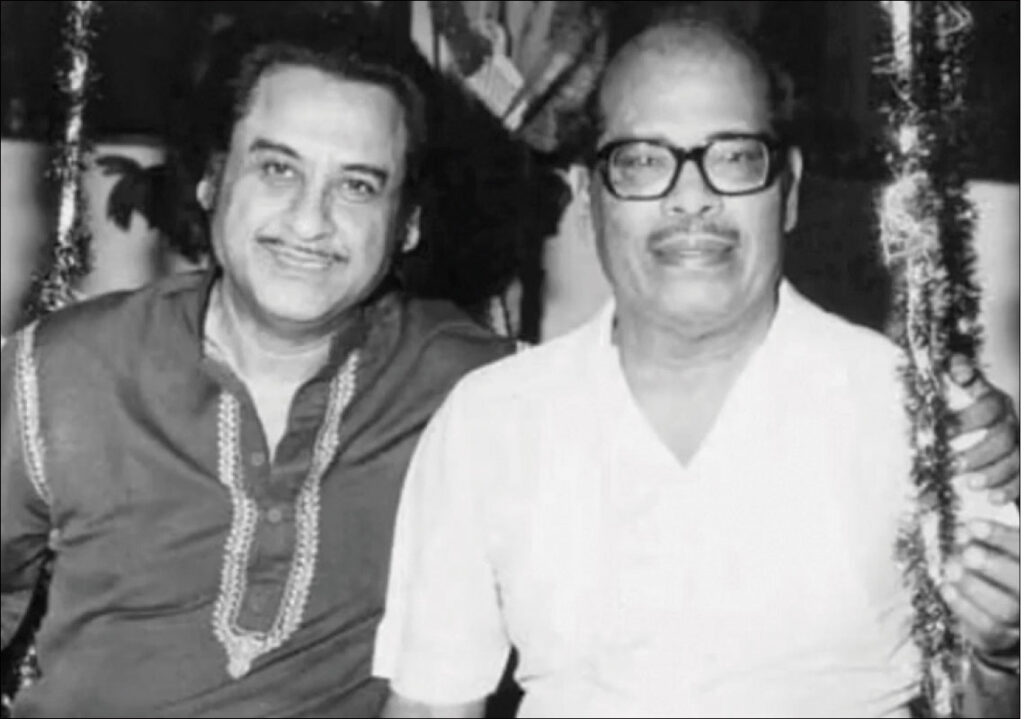
One of Kishore’s most pleasing triumphs during this phase was the 1958 Chalti ka naam gaadi, starring Madhubala, Kishore himself and his two brothers Ashok and Anoop. This superhit film with several chartbuster songs composed by S D Burman, was arguably Hindi cinema’s best-loved comic entertainer. The three brothers were the producers.
The 1958 Dilli ka thug exemplified Kishore’s versatility as singer. The film presented the zany Kishore-Asha duet C-a-t cat, cat mane billi which was a sensation, but also the soul-stirring, exquisite Kishore-Lata romantic melody Yeh raaten, yeh mausam, nadi ka kinara.
But such successes were sporadic, and Kishore was a frustrated man during the late 1960s. He hadn’t hit the top as singer despite some brilliant songs and display of ample proof of his talent. As an actor, he was no longer young enough to be a hero. He wanted to give up cinema and return home to his beloved Khandwa in Madhya Pradesh, but Ashok Kumar dissuaded him and urged him to stay and focus on playback singing.
1969, the watershed year
Then came Aradhana in 1969. The film not only unleashed the Rajesh Khanna phenomenon but let loose a Kishore tsunami that swept the music world. Even a monumental talent like Mohammed Rafi, Bollywood’s voice of the 1960s and 1970s, was marginalised, and never regained his earlier status.
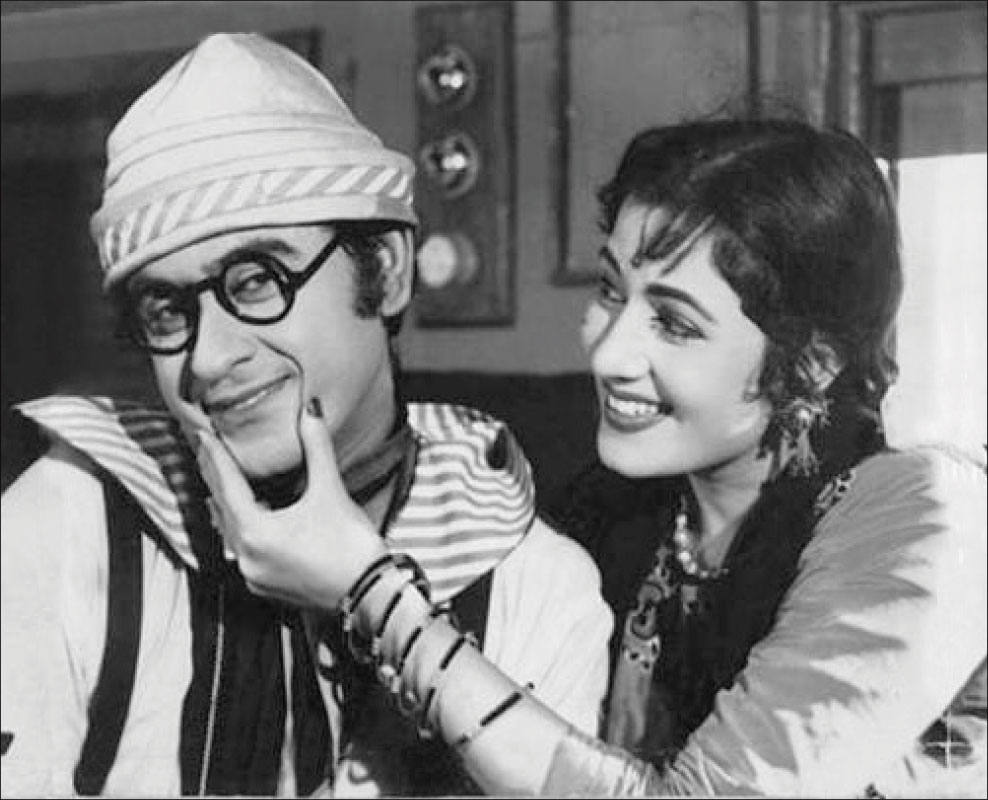
How did this happen? Composer S D Burman was very ill during the making of Aradhana, and his son Pancham (R D Burman), a firm believer in Kishore’s awesome talent, took over. He promptly replaced Rafi with Kishore for two songs that were sheer dynamite — Mere sapnon ki rani, where Rajesh in a jeep serenades Sharmila Tagore on a moving train; and Roop tera mastana, a fiery sensual song of the lead pair before a fire in a cabin, taking shelter from a rainstorm. That song went on to redefine sensuality and raw desire in Hindi cinema.
Both Rajesh Khanna and Kishore were on a roll after Aradhana. Rajesh recorded 15 consecutive hit films between 1969 and 1972, a feat unmatched to this day. Kishore sang 245 songs for him. “Take Kishore’s songs away from Rajesh and he is no more a superstar,” it used to be said. R D Burman’s wizardry fuelled the success of both the superstars.
The Rajesh mania waned after the mid-1970s, and the “angry young man”, Amitabh Bachchan, became the new superstar. But Kishore’s triumphant march continued — he gave voice to Amitabh in 131 songs including numerous hits in films such as Amar Akbar Anthony, Don, Muqaddar Ka Sikandar, Khoon Pasina, Kasme Vaade, etc. Kishore’s voice ruled Bollywood till his death in 1987, ensuring his dominance over an industry that had badly misjudged him earlier.
He received eight Filmfare Awards as best playback singer (all of them between 1969 and 1987) — a record. Mohammad Rafi won only six.
Here’s a short list of my favourite Kishore songs after Aradhana:
- Yeh shaam mastani — Kati Patang, 1971
- Chingari koi bhadke — Amar Prem, 1971
- O meri sharmilee — Sharmilee, 1971
- Tere mere milan ki yeh raina — Abhimaan, 1972
- Musafir hoon yaaron — Parichay, 1972
- Is mod se jaate hain — Aandhi, 1975
- O maajhi re — Khushboo, 1975.
- Kabhi alvida na kehna — Chalte Chalte, 1976
- Hamey tumse pyar kitna — Kudrat, 1981
Those who influenced him
Kishore was fascinated early in life by the Israeli singer and entertainer Chaim Topol, and reportedly saw his movie Fiddler on the Roof more than a hundred times. In 1983 in London, he learnt from a newspaper advertisement that Fiddler on the Roof was being staged that day, and was thrilled. He attended four consecutive shows, also went backstage and presented Topol with a set of his audio cassettes. The Israeli star in turn gave Kishore a copy of his autobiography, Topol by Topol. “No one can act like him!” raved Kishore.
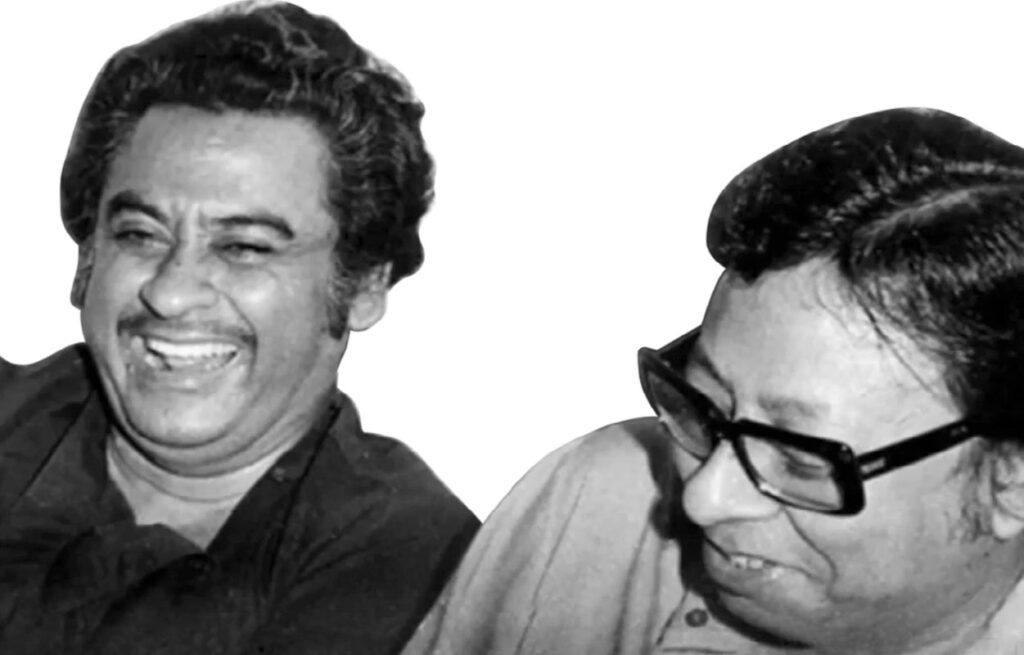
Kishore was the first yodeller of Hindi cinema. S D Burman had advised him to develop his own style of music. He listened to some Austrian records of his brother Anoop Kumar, researched singers from the US, Australia and New Zealand, and made yodelling a part of his repertoire. “I encouraged his yodelling,” said Dev Anand. “It sounded like the cry of a solitary voice in the loneliness of the hills, a cry for romance.”
He didn’t smoke, drink or socialise, but was a big eater. His niece Preeti Ganguly (Ashok Kumar’s daughter) discloses that he was hugely fond of mangshor jhol, a Bengali mutton curry dish. He also loved gobi (cauliflower). He would say, “Cover me with mounds of fried gobi. I’ll lie under them and keep eating the gobi.”
Personal life
Kishore married four times; to Ruma Guha Thakurtha (1950–58), Madhubala (1960–68), Yogeeta Bali (1976–78) and Leena Chandavarkar (1981–87). He referred to his four wives as “bandaris” because all of them lived in Bandra!
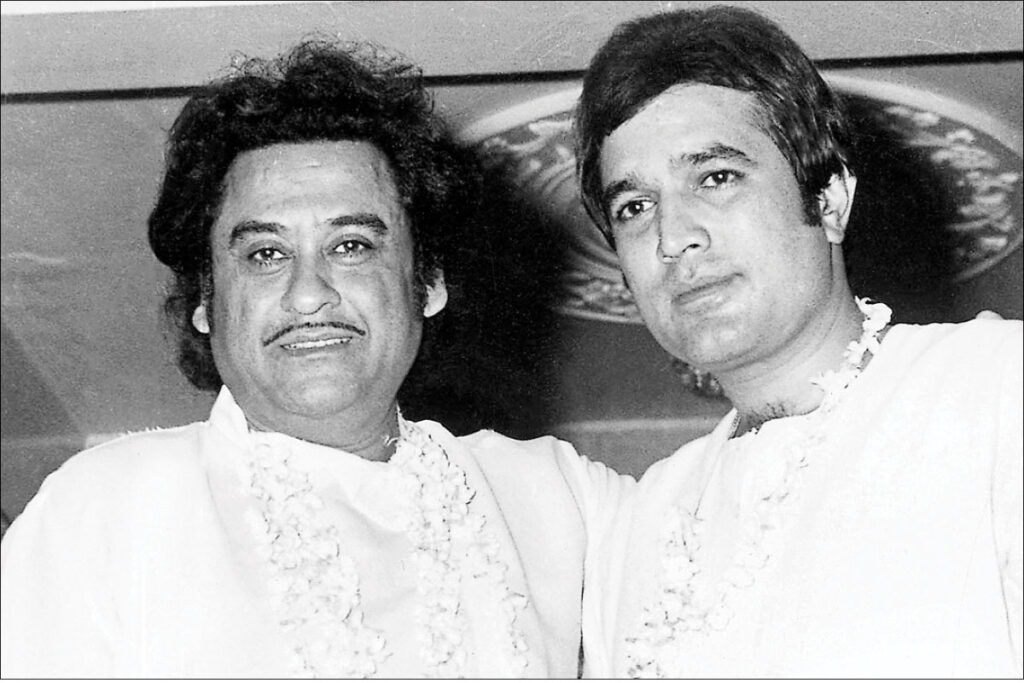
He was a maverick, an iconoclast, a loner. The stories of his eccentricities are legend. A signboard outside his door said ‘Beware of Kishore’. He was fond of horror films and had a collection of hundreds of video cassettes of this genre. He described the trees in his garden as his only friends, gave them names, and talked to them. He was particular about being paid promptly. On one occasion, a producer paid him only half the agreed amount. Kishore appeared on the sets with one side of his head and face shaven. He said “Adha fee, adha make-up.”
Despite his reputation for being tight-fisted, Kishore helped out Satyajit Ray with a loan when his 1955 epic Pather Panchali got stalled at a critical time, and sang a song free of charge for Ray’s 1964 movie Charulata. When the maestro asked about the fee payable, the singer just touched Ray’s feet. Kishore also sang three songs for Ray’s 1984 film Ghare Baire, again without a fee.
During the Emergency years, Kishore reacted with a blunt “No” when asked to promote a government programme. Result: All India Radio banned his songs. He also suffered several IT raids, and had to conduct a number of stage shows to pay his tax dues. He said in an interview that one day, a few people knocked on his door saying “we are from the IT department. Your dogs are chasing us.” Kishore responded “don’t worry. I have given my dogs strict instructions not to bite income tax officers.”
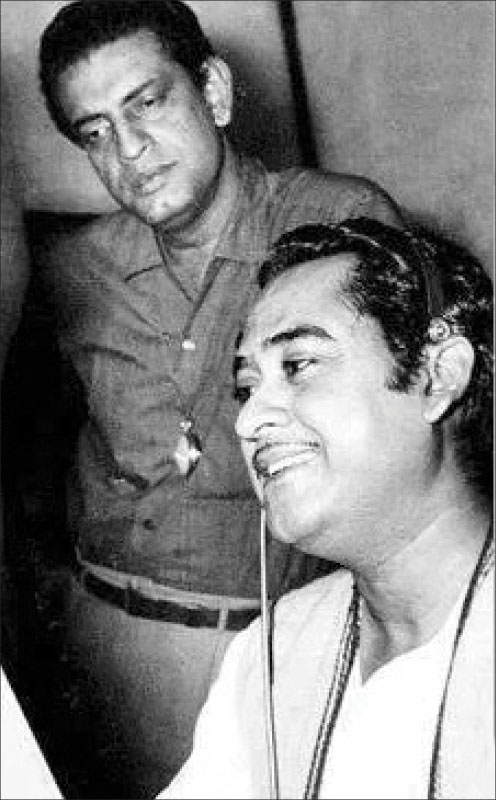
Kishore often played pranks during dialogue rehearsals. He would tell Meena Kumari what he was supposed to tell Bina Rai in another film. He enjoyed the look of bewilderment on the heroine’s face and would burst into laughter.
Kishore passed away in 1987, when he was just 58. He died on Ashok Kumar’s birthday, and the veteran actor never celebrated his birthday again. Kishore’s reputation and mystique have grown massively after his death, and he lives on, just like his famous song in Chalte Chalte: Kabhi alvida na kehna.
Editor’s pick:
- Mere Mehboob qayamat hogi
- Yeh raaten yeh mausam nadi ka kinara
- Neele neele ambar par, chand jab aaye
- Haal kaisa hei janab ka.
The writer is a senior journalist and member of RC Madras South.





